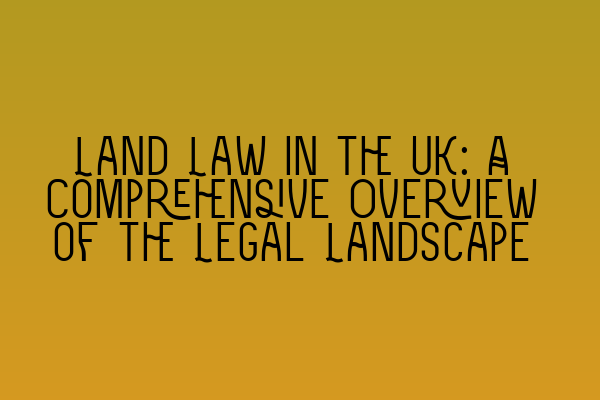Land Law in the UK: A Comprehensive Overview of the Legal Landscape
Welcome to SQE Property Law & Land Law, where our team of expert solicitors specializes in providing comprehensive legal advice and assistance in all matters related to land law in the UK. In this blog post, we will provide you with a comprehensive overview of the legal landscape of land law in the UK, covering key concepts, statutes, and cases that shape the field.
What is Land Law?
Land law encompasses the legal rights and regulations governing the ownership, use, and transfer of land and real property. In the UK, land law is primarily governed by a combination of statutes, common law principles, and equitable doctrines.
Key Concepts in Land Law
Before diving deep into the legal framework, it is important to understand key concepts in land law:
- Freehold: This refers to absolute ownership of land and is the highest form of ownership interest.
- Leasehold: In leasehold, a person has a fixed period of exclusive possession and use of a property owned by another.
- Equitable Interests: These are proprietary rights that arise in equity, often when legal ownership and beneficial interests are separated.
- Registered Land: This is land that is registered with the Land Registry, ensuring transparency and ease of transactions.
Statutory Framework
Land law in the UK is mainly governed by two key statutes:
- Law of Property Act 1925: This Act sets out the rules relating to the creation, disposition, and management of legal and equitable interests in land.
- Land Registration Act 2002: This Act introduced a comprehensive system of land registration, making it easier to prove ownership and transfer land.
These statutes provide a solid foundation for land law in the UK and have been supplemented by various other acts and regulations, including the Law of Property (Miscellaneous Provisions) Act 1989, the Landlord and Tenant Act 1954, and the Town and Country Planning Act 1990.
Case Law and Landmark Decisions
Land law in the UK has also been shaped significantly by case law and landmark decisions. Here are a few notable cases worth mentioning:
- Pyer v Carter (1857): This case established the doctrine of adverse possession, which allows a person to acquire ownership rights over a property through continuous and uninterrupted possession for a specified period.
- Street v Mountford (1985): This case clarified the distinction between a lease and a license, emphasizing the importance of exclusive possession and a fixed term in determining the existence of a leasehold agreement.
- Stack v Dowden (2007): In this case, the House of Lords provided guidance on the division of property rights upon the breakdown of cohabiting relationships, emphasizing the need to consider the parties’ intentions and contributions.
To gain a deeper understanding of these landmark cases and influential judicial decisions, you may want to explore our related article on SQE Contract Law: Analyzing Landmark Cases and Influential Judicial Decisions.
Land Law and Contracts
Land transactions often involve contracts, and understanding the relationship between land law and contracts is crucial. Contractual capacity, rights, and limitations play a significant role in land law. To delve deeper into this topic, we recommend reading our informative article on Understanding Contractual Capacity: Rights and Limitations.
Preparing for the SQE Land Law Exam
If you are planning to take the SQE Land Law Exam, it is essential to master the essentials of land law. Our team at SQE Property Law & Land Law offers SQE prep resources designed to help you succeed. You may find our SQE Prep: Mastering the Essentials of Contract Law article particularly useful.
Expert Guidance and Webinars
At SQE Property Law & Land Law, we understand the importance of expert guidance in understanding complex legal concepts. Join our SQE Contract Law webinars for expert insights and guidance. You can find more information and sign up for our webinars on Join Our SQE Contract Law Webinars: Expert Insights and Guidance.
Conclusion
Land law in the UK is a complex and dynamic field that encompasses various legal principles, statutes, and cases. Understanding the legal landscape is crucial when dealing with land transactions and disputes. By exploring the key concepts, statutes, cases, and our related articles, you can develop a comprehensive understanding of land law in the UK.
If you have any specific queries or require legal assistance for your land-related matters, feel free to reach out to our solicitors at SQE Property Law & Land Law. Our team is here to provide expert legal advice and support.
